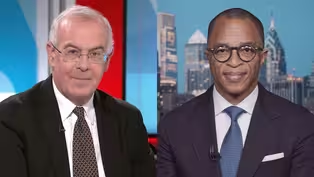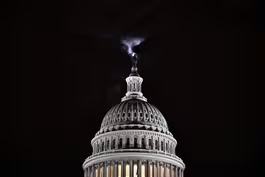
The art of sound design in the film ‘The Zone of Interest
Clip: 3/8/2024 | 6m 47sVideo has Closed Captions
The art of sound design in the Oscar-nominated film ‘The Zone of Interest’
With the 96th annual Academy Awards being held on Sunday, there is excitement surrounding the film “The Zone of Interest,” with its remarkable soundscape evoking the worst of the Holocaust. Special correspondent Malcolm Brabant visited Oscar-nominated sound designer Johnnie Burn at his studio, as part of our arts and culture series, CANVAS.
Problems playing video? | Closed Captioning Feedback
Problems playing video? | Closed Captioning Feedback
Major corporate funding for the PBS News Hour is provided by BDO, BNSF, Consumer Cellular, American Cruise Lines, and Raymond James. Funding for the PBS NewsHour Weekend is provided by...

The art of sound design in the film ‘The Zone of Interest
Clip: 3/8/2024 | 6m 47sVideo has Closed Captions
With the 96th annual Academy Awards being held on Sunday, there is excitement surrounding the film “The Zone of Interest,” with its remarkable soundscape evoking the worst of the Holocaust. Special correspondent Malcolm Brabant visited Oscar-nominated sound designer Johnnie Burn at his studio, as part of our arts and culture series, CANVAS.
Problems playing video? | Closed Captioning Feedback
How to Watch PBS News Hour
PBS News Hour is available to stream on pbs.org and the free PBS App, available on iPhone, Apple TV, Android TV, Android smartphones, Amazon Fire TV, Amazon Fire Tablet, Roku, Samsung Smart TV, and Vizio.
Providing Support for PBS.org
Learn Moreabout PBS online sponsorshipGEOFF BENNETT: The Academy Awards are being held in Los Angeles Sunday.
"Oppenheimer" is getting much of the buzz, but there's also excitement surrounding a film called "The Zone of Interest," with its remarkable soundscape evoking the worst of the Holocaust.
Special correspondent Malcolm Brabant visited Oscar-nominated sound designer Johnnie Burn at his studio as part of our arts and culture series, Canvas.
MALCOLM BRABANT: At an art cinema in Southern England 5,500 miles from Hollywood, the audience is preparing to be assailed by the sonic genius of Johnnie Burn.
JOHNNIE BURN, Sound Designer: I can't say how you enjoy it, because it's -- that might not be the right word, but I hope you appreciate it.
ACTRESS (through translator): And that's the camp wall?
MALCOLM BRABANT: "Zone of Interest" chronicles the mundane existence of a Nazi family living next to Auschwitz, while more than a million people are being murdered just over the garden wall.
For his depiction of the banality of evil, director Jonathan Glazer has earned multiple Oscar nominations.
JOHNNIE BURN: Jonathan Glazer is very clever.
He draws upon the collective knowledge that we all have of that period of time in history to paint pictures in your head.
MALCOLM BRABANT: And while the genocide of Auschwitz is ever present, the audience never casts eyes on it.
JOHNNIE BURN: I think sound is an extraordinary phenomenon.
For me, I believe that we react to it.
Immediately, you hear something, your subconscious and your primal brain starts appending history and artifacts and nouns to that in a way that with visual images you process it with sound.
You react to it.
MALCOLM BRABANT: This garden was a haven for the man in the white suit.
Rudolf Hoss on the right was the commandant of Auschwitz.
Hoss was captured after the war and executed in Auschwitz in 1947, not far from this backyard.
ACTRESS (through translator): The heartfelt time we spent in the Hoss house will always be among our most beautiful holiday memories.
JOHNNIE BURN: They would walk people into the gas chamber, and they believed they were going for a shower, but, obviously, they were not.
And that would create quite a noise.
MALCOLM BRABANT: Johnnie Burn worked his alchemy at home, to the alarm of his family.
JOHNNIE BURN: I have worked on many films in that back room, and some very loud grisly monsters and all sorts.
And it's never a problem.
But for this, I had to buy a soundproof door, because it really is the most violent film I have ever worked on.
And yet you don't see any violence.
MALCOLM BRABANT: In your drive to be authentic, how important was it for you, at the same time, to respect the sanctity of Auschwitz, and also to honor the memory of the people who died there?
JOHNNIE BURN: I knew there was great responsibility not only to make the film work through sound, but to make sure that the sound we were using was historically accurate and as faithful as possible to the atrocities that happened there, without going to the point of sensationalizing.
ACTRESS: The azaleas there.
There are also vegetables.
MALCOLM BRABANT: In this scene, it's the wife of the commandant and her mother's come to visit.
JOHNNIE BURN: There's obviously all the sound that's in the garden, but the sound that's telling the other story is what you're hearing from the other side of the wall.
What it actually is, is a collection of sounds that I have recorded over a period of a year, of finding things from research that represent what happened there.
MALCOLM BRABANT: Heavy industry, soldiers marching, the echo of the orchestra that played inside Auschwitz, and riots in Paris.
JOHNNIE BURN: I wanted to go out into the world and find where screaming actually exists.
And given the context of what you're watching in the film, placing those sounds in the background very quietly is an awful lot more convincing than having a sort of actor recreate it.
MALCOLM BRABANT: Talk us through what's happening here.
JOHNNIE BURN: So, this is the boys in their bedroom at night.
And the elder boy is on the top bunk looking at some teeth.
MALCOLM BRABANT: Gold teeth.
JOHNNIE BURN: Gold teeth.
MALCOLM BRABANT: Extracted from corpses in the gas chamber before they were incinerated.
JOHNNIE BURN: There's a particular sound here that the boy hears.
It's a rhythm of his daily life.
MALCOLM BRABANT: The suggestion, that is the sound of the furnaces working overtime to eviscerate evidence of the Nazis' crimes.
JOHNNIE BURN: I made something here with my fireplace and some tubes to fan the flames in a microphone, and I layered that up to become a thicker, bigger sound.
MALCOLM BRABANT: Which provides the backdrop to one of the movie's most powerful scenes.
It's the end of the day, and he's in his garden having a cigarette.
JOHNNIE BURN: This is the sound of what happened afterwards.
This is, I think, just over the garden wall with the crematoria and the gas chambers.
MALCOLM BRABANT: Burn had to track down a vintage Nazi motorcycle to add one key detail.
JOHNNIE BURN: They used to run motorbikes at Auschwitz in order to preserve the sanity of the guards.
Can you believe?
MALCOLM BRABANT: To drown out the screams.
JOHNNIE BURN: Absolutely, yes.
MALCOLM BRABANT: As awards season reaches its zenith, the accolades keep coming.
MAN: The BAFTA goes to "Zone of Interest," Johnnie Burn, Tarn Willers.
(APPLAUSE) JOHNNIE BURN: Good evening.
Yes, it's funny to be standing here.
My mother wouldn't have understood this.
She always said to me, what do you mean you do the sound on films?
They sound all right to me.
(LAUGHTER) (APPLAUSE) JOHNNIE BURN: And I had to explain to her.
I did.
MALCOLM BRABANT: Johnnie Burn and his sound team may have won Britain's highest film award, but the Oscars are a much tougher prospect.
As always, there's a very strong field, but that it appears that "Zone of Interest"s main competitor is "Oppenheimer," the film about the father of the atomic bomb.
JOHNNIE BURN: I have had it said to me by many of my very illustrious peers that what you have made here is one of the most significant pieces of sound design in cinema ever, potentially.
So, great.
And that's Jonathan Glazer's, really, more than anything else.
MALCOLM BRABANT: Burn only has two days to wait to discover whether the academy feels the same way.
For the "PBS NewsHour," I'm Malcolm Brabant in Brighton.
Brooks and Capehart on Biden’s State of the Union address
Video has Closed Captions
Clip: 3/8/2024 | 11m 35s | Brooks and Capehart on Biden’s State of the Union and what’s next in the 2024 race (11m 35s)
How Hungary’s Orbán gives Trump an ‘illiberal’ roadmap
Video has Closed Captions
Clip: 3/8/2024 | 5m 40s | Hungary’s Orbán gives Trump an “illiberal” roadmap for American conservatives (5m 40s)
What’s in the new spending bill the Senate is racing to pass
Video has Closed Captions
Clip: 3/8/2024 | 5m 47s | What’s in the new spending bill the Senate is racing to pass to avoid a shutdown (5m 47s)
Why many Americans feel unhappy about the country’s economy
Video has Closed Captions
Clip: 3/8/2024 | 7m 48s | Why many Americans feel unhappy about the economy despite indicators of improvement (7m 48s)
Providing Support for PBS.org
Learn Moreabout PBS online sponsorship
- News and Public Affairs

FRONTLINE is investigative journalism that questions, explains and changes our world.

- News and Public Affairs

Amanpour and Company features conversations with leaders and decision makers.












Support for PBS provided by:
Major corporate funding for the PBS News Hour is provided by BDO, BNSF, Consumer Cellular, American Cruise Lines, and Raymond James. Funding for the PBS NewsHour Weekend is provided by...



